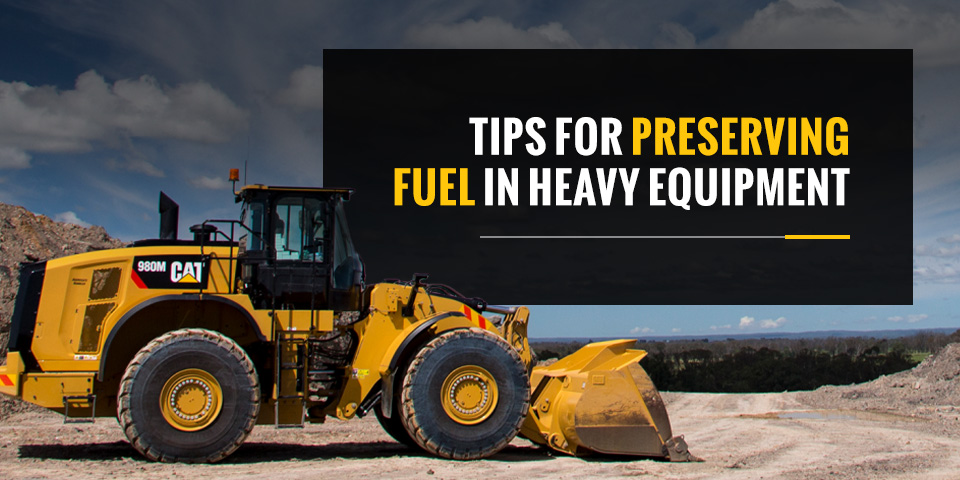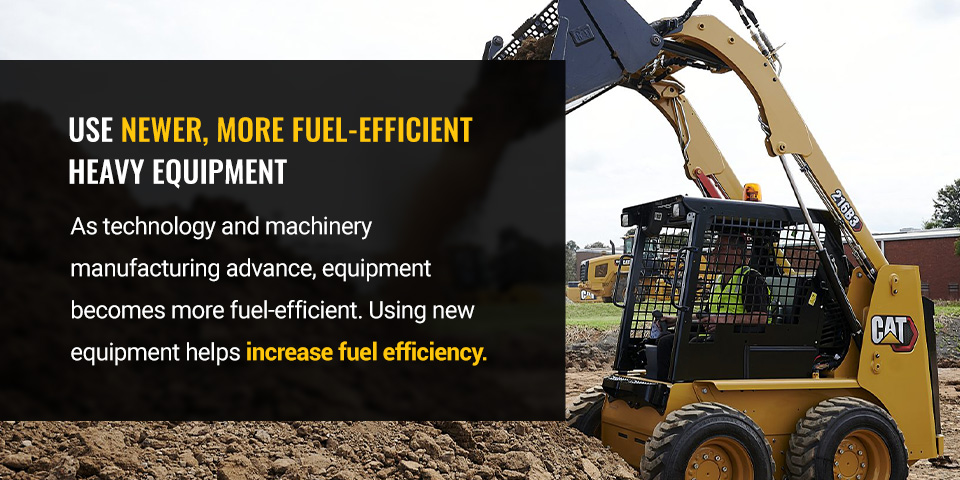
Preserving fuel in heavy equipment can reduce overhead costs, increasing a company’s profit. Fuel efficiency is one of the most important parts of decreasing construction expenses, and you can improve efficiency with simple tips and strategies. From driving habits to proper maintenance, each small step allows you to accomplish more work with less fuel.
Importance of Fuel Efficiency in the Construction Industry
Heavy equipment fuel consumption is an essential consideration in construction applications. To understand fuel consumption and costs, it’s important to differentiate between fuel economy and fuel efficiency.
Fuel economy refers to how much fuel a machine uses in a certain amount of time. Fuel efficiency indicates how much fuel a machine uses and how much it accomplishes with that fuel. For example, two excavators with the same fuel economy may each use 5 gallons of fuel within two hours. However, the excavator with a higher fuel efficiency can complete more work than one with lower efficiency.
Managing fuel efficiency is one of the most effective ways to save money when using heavy machinery. The more work you can complete with less fuel, the more money your company can save. While fuel consumption may seem insignificant compared to equipment investments and labor costs, reducing it can make an immense difference in overhead and profit.
Heavy Equipment Fuel Preservation Tips
Fuel use in heavy equipment is one of the most significant construction costs. You can improve fuel efficiency with the following tips:
1. Reduce Unnecessary Idling Time
Letting a machine idle for too long can waste substantial fuel. Operators may start a machine before they are ready to begin operation, allowing their equipment to consume fuel without completing tasks. This can also happen at the end of a work day if a worker allows their machine to idle before turning it off.
Modern machinery eliminates the need to idle for heating and cooling purposes. Engines can now warm up and cool down rapidly, allowing workers to start operations as soon as they turn the key.
It’s crucial to ensure operators turn their engines off as soon as they finish work and wait until they are ready to resume work to turn engines back on. Reminding machine operators to minimize idling time, tracking fuel usage, and setting time limits for machine operation can help decrease fuel consumption. Reducing unnecessary idling also benefits the environment by decreasing the greenhouse gases machines release into the atmosphere.
2. Drive Slowly
Driving at high speeds consumes more fuel at a faster rate than driving at a reasonable, steady speed. Equipment and engine manufacturers typically provide a recommended speed for optimal fuel efficiency. While it’s primarily the operator’s responsibility to control speed during work, fleet managers can help.
If you need to manage your fleet’s equipment speed, consider the following tips:
- Install equipment systems that limit engine speed.
- Monitor operator speeds using fleet management software.
- Frequently remind drivers and operators to drive at the manufacturer’s recommended speed or slower.
3. Monitor RPM
Monitoring engine RPMs is also essential. Shifting gears at lower RPMs uses less fuel than shifting at high RPMs. Reminding operators to shift at lower RPMs can help improve fuel efficiency. It’s important to use the gear that achieves the proper ground speed at a reduced RPM without overloading the engine.
4. Drive on Smooth Surfaces
Driving on smooth surfaces decreases a machine’s rolling resistance. While driving on rough terrain is often necessary on construction sites, keeping equipment on smooth paths as much as possible can help improve fuel efficiency.
5. Create Effective Job Site Layouts
Creating an effective layout for each job also reduces fuel consumption. Plan layouts so machines have the shortest travel distances possible. The right travel patterns decrease the turns each vehicle needs to make and reduce idling.
6. Use the Right Machine for Each Job
A machine with too much or too little horsepower for a particular job causes it to consume more fuel than necessary. Sizing machines for each job allows you to choose the most efficient option and use minimal fuel.
7. Use Newer, More Fuel-Efficient Heavy Equipment
While using the right size machine for each job is important, using new equipment also helps increase fuel efficiency. As technology and machinery manufacturing advance, equipment becomes more fuel-efficient. Upgrading your fleet can significantly improve fuel efficiency.
8. Maintain Equipment Regularly
In addition to understanding how to conserve fuel in heavy equipment, operators and managers must also ensure they schedule regular machine maintenance. Regular inspection and maintenance addresses the following complications that can increase fuel consumption:
- Blocked air filters
- Stuck valve lifters
- Malfunctioning thermostats
- Inadequate throttle linkage
- Ring and valve wear
- Fuel contaminated with water
- Engine liming
- External leakage
- Loose or damaged fuel caps
9. Check Tire Pressure and Reduce Slipping
Too low or high tire pressure can reduce fuel efficiency. Maintenance professionals should check tire pressure as part of their regular inspections, but operators and equipment managers can also monitor tire pressure and make adjustments as necessary.
Adequate rolling resistance is also important for fuel efficiency. A heavy machine uses more fuel when its tires slip too much, and slipping strains the engine. An operator should always remove ballast when carrying a lighter load, and they should always ensure they have sufficient ballast when hauling a heavier load.
10. Use the Proper Fuel Grade and Storage
Using the proper fuel grade helps increase efficiency, and protecting fuel tanks prevents evaporation. Ensure operators use the proper fuel grade according to the manufacturer’s recommendation. It’s also important to keep each fuel storage tank well-shaded. Painted aluminum or white storage tanks evaporate less fuel than red ones.
Service Your Equipment at Thompson Tractor
Fuel efficiency is an important part of saving money and maintaining a reasonable overhead. Reducing fuel consumption and making the most of the fuel your team uses can help you decrease costs and increase profits. You can decrease fuel consumption and significantly improve fuel efficiency by regularly maintaining your construction equipment.
Thompson Tractor offers various heavy machinery preventative maintenance services to keep your equipment in top shape. We perform thorough inspections and maintenance at our shop or on your job site for optimal convenience. Our team repairs or replaces parts when necessary so your equipment operates as efficiently as possible. With excellent experience and timely service, you can trust Thompson Tractor to deliver reliable results.
Contact us to schedule services for your fleet.



